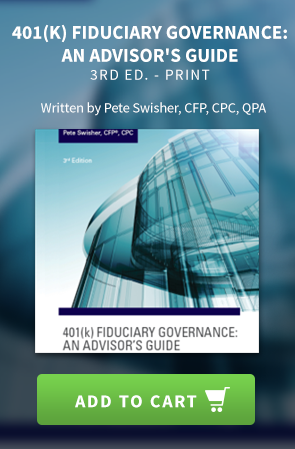IRS Issues
The American Retirement Association (ARA) in a May 11 letter to Eric Slack, Director of the IRS Office of Employee Plans, has recommended recommend improvements in the interim amendment process for pre-approved plan documents
In December 2019, the letter notes, during a conference call relating to...
READ MORE
A $3 trillion stimulus bill released by House Democrats includes retirement provisions advocated by the American Retirement Association—and a whole lot more—though its passage is anything but certain.
The mammoth 1,800-page bill runs the gamut from providing nearly $1 trillion to state and...
READ MORE
Tech Talk addresses whether deferral elections in a nongovernmental 457(b) plan can be increased, reduced or cancelled.
READ MORE
In MarketBeat, John Iekel discusses a blog entry concerning the unique roles of investment committees and outsourced chief investment officers in pursuing and implementing strategies for the investment of plan assets.
READ MORE
The government has provided more time for borrowers to assess whether their loan under the Paycheck Protection Program (PPP) was necessary and whether they need to return it.
In a May 6 update to their Frequently Asked Questions (FAQs), the Small Business Administration and Treasury Department...
READ MORE
A controversial call by the IRS on deductibility of expenses under the Paycheck Protection Program is drawing fire from both parties and both houses of Congress.
No less than the chairmen of the congressional tax-writing committees have expressed concern with the IRS’ interpretation denying...
READ MORE
In MarketBeat, Maria Hurd writes about the required minimum distribution rules under the SECURE Act and how they affect financial statement audits.
READ MORE
The IRS had some unwelcome news for plan advisors and small businesses that may be taking advantage of forgivable loans under the Paycheck Protection Program.
In short, the IRS is saying no to the potential for a double-tax benefit. The IRS advises in Notice 2020-32 released April 30 that it...
READ MORE
The IRS has provided questions and answers concerning the provisions of the Coronavirus Aid, Relief, and Economic Security Act (CARES) Act and how they apply to and affect retirement plans and IRAs.
Specifically, the May 4 Q&As concern Section 2202 of the CARES Act, which provides for special...
READ MORE
Recent guidance clarifies that retirement contributions for unincorporated sole proprietors are excluded from payroll costs in calculating the maximum loan amount under the Paycheck Protection Program (PPP)—and so can’t be forgiven under the terms of that program.
Specifically, the Small Business...
READ MORE
The IRS now will accept both paper and electronic requests for advice. The IRS announced on April 30 that it is allowing the electronic submission of requests for letter rulings, closing agreements, determination letters and information letters under the jurisdiction of the IRS Office of Chief...
READ MORE
Tech Talk addresses whether a pre-approved 403(b) plan can have an optional retirement plan (ORP) provision, and if so, if it would fall under the mandatory contributions.
READ MORE
Updated July 7, 2020
NTSA provides extensive coverage concerning a host of aspects of the pandemic and its consequences for plan sponsors, administrators, service providers and participants. This includes how developments resulting from it have affected plans and participants, and how they can...
READ MORE
Tech Talk discusses how an employer be characterized or defined when its 501(c)(3) status is “public charity” and its website uses the word “church” but there are complicating circumstances.
READ MORE
A common question regarding the CARES Act distribution, loan and required minimum distribution (RMD) waiver provisions [1] is whether these provisions are optional or mandatory. In most cases, they are optional – but in the retirement world there are very few questions where a short answer will...
READ MORE
The pandemic has had a wide range of effects on employee benefits and those who provide and administer plans. A recent blog entry discusses the effects regarding nongovernmental 457(b) plans.
In “Answering Questions About COVID-19 and your Nongovernmental 457(b) Plans,” Fulcrum Partners LLC...
READ MORE
The IRS has published some good news for Form 5500 filers—well, some Form 5500 filers. And that includes some 403(b) plans.
Under Notice 2020-23, released April 9, the extensions[i] generally now apply to all taxpayers that have a filing or payment deadline falling on or after April 1, 2020, and...
READ MORE
Effective on Jan. 1, 2008, IRC §408A(e) permitted the rollover of eligible distributions from 401(a), 401(k), 403(b) and governmental 457(b) plans directly to a Roth IRA. These are referred to by the IRS as QRCs, and by some in the industry “direct conversions.” Therefore, after that date there is...
READ MORE
Last week the question arose as to whether retirement plan contributions for small businesses were covered under the CARES Act’s Paycheck Protection Program—now we have a definitive answer.
As was noted last week, Section 1102 of the Coronavirus Aid, Relief, and Economic Security (CARES) Act of...
READ MORE
In MarketBeat, Robert Richter writes that determining a participant’s employment status, more specifically whether there has been a severance of employment, must be made in order to apply a wide variety of rules that apply with qualified plans, Code Section 403(b) arrangements and 457(b) plans.
READ MORE


